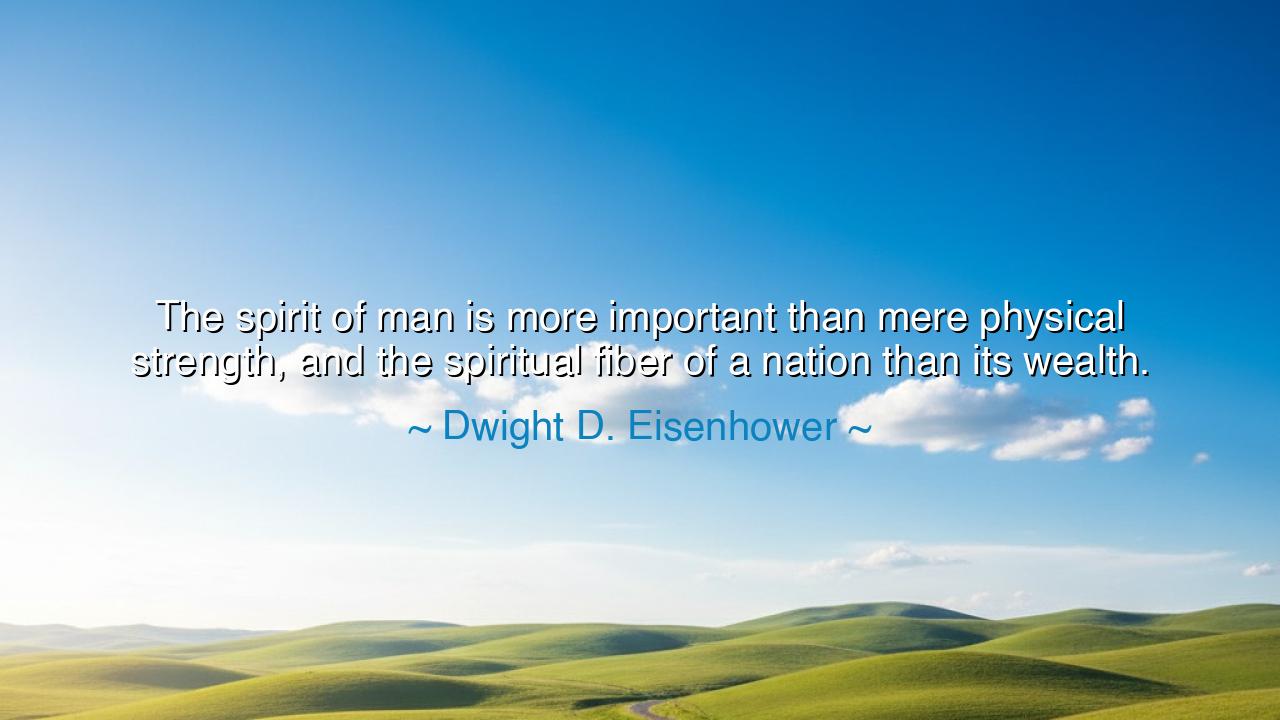
The spirit of man is more important than mere physical strength
The spirit of man is more important than mere physical strength, and the spiritual fiber of a nation than its wealth.






The words of Dwight D. Eisenhower shine like a torch passed from a warrior to his people: “The spirit of man is more important than mere physical strength, and the spiritual fiber of a nation than its wealth.” Spoken by one who had commanded armies and later guided a people, these words remind us of an eternal truth—that flesh may falter, riches may vanish, but the unseen spirit endures. In them is both a warning and a promise: if a man or a nation builds only on muscle or gold, he will fall when storms come; but if he builds on spirit, he shall stand unshaken.
Eisenhower himself knew the weight of these words. As the Supreme Commander of Allied forces during the Second World War, he had seen the futility of armies that relied only on weapons and numbers. He understood that victory was not won by strength alone, but by the courage, resolve, and unity of the human spirit. It was not the wealth of factories or the number of tanks alone that defeated tyranny, but the steadfast belief of ordinary men and women that freedom was worth sacrifice.
The ancients knew this truth before him. Consider the tale of Leonidas and the three hundred Spartans at Thermopylae. Their strength of arms was nothing compared to the legions of Persia, their wealth but dust before the treasures of the East. Yet their spirit—unyielding, fearless, burning with devotion to their homeland—became a beacon that lit all of Greece. Their bodies fell, but their spiritual fiber endured, inspiring their people to rise and drive back the invader. Wealth could not have bought such courage; only spirit could give it.
In another age, look to Mahatma Gandhi. He commanded no armies, carried no sword, and possessed no treasury. By material measure, he was weaker than the empire he opposed. Yet his spiritual fiber, rooted in truth and nonviolence, shook the foundations of British rule in India. He proved, as Eisenhower declared, that the destiny of a nation rests not in its wealth, but in the unseen strength of its people’s convictions. His victory was not of coin or muscle, but of the enduring spirit.
Eisenhower’s words also serve as a warning to modern nations. Wealth may dazzle, industries may tower, and armies may march in splendor, but if the people’s spiritual fiber is corroded—if corruption, selfishness, and despair hollow the heart—then collapse is inevitable. History bears witness: mighty Rome, rich and powerful, crumbled not first from the blows of its enemies, but from the decay of its inner spirit. No gold nor gladiator could save a nation whose soul had grown weak.
The lesson for us is this: guard your spirit more than your body, and guard your nation’s fiber more than its gold. For bodies wither, and wealth is fleeting, but a spirit of courage, humility, and faith will outlast the ages. A nation’s survival is not secured by banks and armies, but by the integrity of its people, by the values they refuse to surrender, by the quiet resolve of their hearts.
Practical action lies before you. Strengthen your spirit daily, as you would strengthen the body. Feed it with truth, discipline it with sacrifice, temper it with humility. And as a people, build communities not on greed but on service, not on wealth but on honor. Teach the young not only to chase riches, but to uphold values. Stand together in trials, and remember that unity of spirit is a greater fortress than any wall of stone.
So let Eisenhower’s words endure as timeless counsel: the spirit of man outshines his strength, and the spiritual fiber of a nation outweighs its wealth. For when wealth crumbles and strength falters, it is the spirit that remains, carrying both man and nation through the darkness into the dawn.






AAdministratorAdministrator
Welcome, honored guests. Please leave a comment, we will respond soon